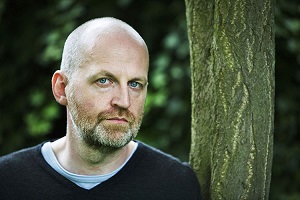Onafhankelijk van geboortedata
De Schotse dichter, schrijver en jazzmuzikant Don Paterson werd geboren in 1963 in Dundee. Paterson verliet de school op 16-jarige leeftijd om als muzikant te werken. In 1984 ging hij naar Londen, waar hij gitaarlessen volgde bij Derek Bailey en speelde in Ken Hyder’s band Talisker. Op dat moment begon hij ook zich voor poëzie te interesseren en zelf te schrijven. Sinds de late jaren 1980 was Paterson actief met zijn jazzband Lammas, waarin ook Tim Garland, Talvin Singh en Christine Tobin speelden. Lammas bracht vijf albums uit. Na een aantal jaren in Brighton werd Paterson in 1993 Writer in Residence aan de universiteit van Dundee. In 1995 keerde hij terug naar Londen, waar hij een functie als redacteur bij Picador aanvaardde. Toen hij in 1998 naar Edinburgh verhuisde, begon hij columns voor Scotland on Sunday te schrijven en recensies over videogames voor The Times. Sinds 2000 is hij ook professor aan de universiteit van St. Andrews. Naast diverse eigen dichtbundels publiceerde hij vertalingen van gedichten van Antonio Machado en Rilke’s Sonnetten aan Orpheus, aforismen, hoorspelen, theatervoorstellingen en schreef hij voor het Dundee Repertory Theater, muziekstukken voor o.a. . Tommy Smith en gaf hij bloemlezingen uit. Voor Paterson’s eerste gepubliceerde dichtbundel “Nil Nil” ontving hij in1993 de Forward Poetry Prize, die hij in 2008 eveneens ontving voor het gedicht „Love Poem For Natalie ‘Tusja’ Beridze“ en in 2009 voor de bundel “Rain”. Voor “God’s Gift to Women” (1997) kreeg hij de T. S. Eliot-prijs, net als voor “Landing Light” (2003), dat ook de Whitbread Book Award won. In 2010 ontving Paterson de Queen’s Gold Medal for Poetry en in 2012 een Cholmondeley Award. Hij is een Fellow van de Royal Society of Literature.
Poetry
In the same way that the mindless diamond keeps
one spark of the planet’s early fires
trapped forever in its net of ice,
it’s not love’s later heat that poetry holds,
but the atom of the love that drew it forth
from the silence: so if the bright coal of his love
begins to smoulder, the poet hears his voice
suddenly forced, like a bar-room singer’s — boastful
with his own huge feeling, or drowned by violins;
but if it yields a steadier light, he knows
the pure verse, when it finally comes, will sound
like a mountain spring, anonymous and serene.
Beneath the blue oblivious sky, the water
sings of nothing, not your name, not mine.
The Lie
As was my custom, I’d risen a full hour
before the house had woken to make sure
that everything was in order with The Lie,
his drip changed and his shackles all secure.
I was by then so practiced in this chore
I’d counted maybe thirteen years or more
since last I’d felt the urge to meet his eye.
Such, I liked to think, was our rapport.
I was at full stretch to test some ligature
when I must have caught a ragged thread, and tore
his gag away; though as he made no cry,
I kept on with my checking as before.
Why do you call me The Lie? he said. I swore:
it was a child’s voice. I looked up from the floor.
The dark had turned his eyes to milk and sky
and his arms and legs were all one scarlet sore.
He was a boy of maybe three or four.
His straps and chains were all the things he wore.
Knowing I could make him no reply
I took the gag before he could say more
and put it back as tight as it would tie
and locked the door and locked the door and locked the door

